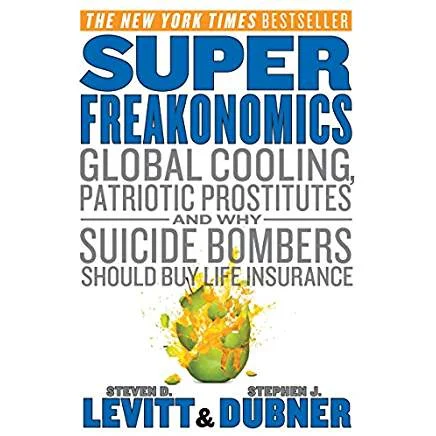Executive #Bookshelf : SuperFreakonomics: Global Cooling, Patriotic Prostitutes, and Why Suicide Bombers Should Buy Life Insurance - Steven D. Levitt
Synopsis
Superfreakonomics—the smash hit follow-up to the remarkable New York Times bestselling phenomenon Freakonomics—is back in a new full-color, fully illustrated and expanded edition. The brainchild of rogue economist Steven D. Levitt and Stephen J. Dubner that once again brilliantly challenges our view of the way the world really works is presented with a new, visual, superfreaky dimension added, enhancing the already provocative thinking about street prostitutes, hurricanes, heart attacks, and other seemingly mundane matters that made Freakonomics and Superfreakonomicspart of the national zeitgeist.
The explanatory note states that the theme of the book explores the concept that we all work for a particular reward. The introduction states we should look at problems economically. The examples given include the preference for sons in India and the hardships Indian women face, as well as the horse manure issue at the turn of the 20th century.
The first chapter explores prostitution and pimps in South Chicago, one high class escort, and real estate brokers. The pimps and brokers are compared based on the idea that they are helping to sell one's services to the larger market. Inequalities in pay grades for men and women are also covered in the chapter.
The second chapter is about patterns and details. Patterns in the ages of soccer players, health issues of children in the womb during Ramadan, and the upbringings of terrorists are observed. Next, the book discusses the skills of hospital doctors and how Azyxxi was created, and draws parallels to how terrorists in the UK were tracked down by banks.
Altruism is discussed in the third chapter, and uses examples of the murder of Kitty Genovese, crime rates as affected by television, and economic experimental games such as Prisoner's dilemma, Ultimatum, and the work of John A. List.
The fourth chapter is about unintended consequences and simple fixes. It goes into detail about Ignaz Semmelweis' work in hospitals, use of seatbelts and child seats, and the possibility of reducing hurricanes.
The fifth chapter discusses externalities and global warming. It discusses how economics does not necessarily take environmental issues into account. Further, the authors posit an alternative way of solving global warming by adding sulfur dioxide to the atmosphere.
The epilogue is about microeconomics, and discusses a study as to whether monkeys can be trained to use money.
Tom’s Take:
As a trained economist, I absolutely love Steven Levitt and Stephen Dubner’s challenges to the questions we come across in life. Obviously skewed towards outrageous examples, it teaches readers to always question their assumptions and even more importantly – to question everything. This is a treasure chest of information for anyone interested in psychology, economics or just sheer human cussedness.
